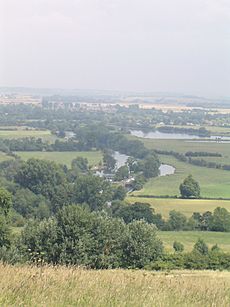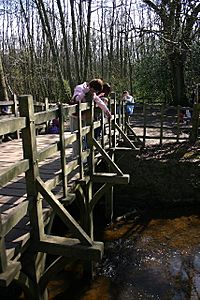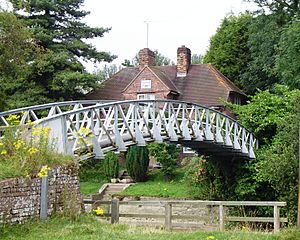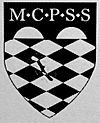Poohsticks facts for kids
Poohsticks is a fun game first mentioned in The House at Pooh Corner. This is a Winnie-the-Pooh book by A. A. Milne. It's a simple game you can play on any bridge over running water. Each player drops a stick into the water on one side of the bridge. The winner is the person whose stick appears first on the other side! There are even annual World Poohsticks Championships held in the UK. They have taken place at Day's Lock on the River Thames since 1984.
How to Play Poohsticks
Poohsticks can be played by two or more people. In the classic way, everyone drops a stick at the same time. You drop your stick on the upstream side of a bridge. Then, you all run to the other side of the bridge. The first person whose stick pops out from under the bridge wins!
Another way to play is to pick a starting point on a river. Then, you choose a finish line further downstream. The winner is the player whose stick crosses the finish line first.
Important Rules
- Your stick should be made of natural materials. Wood, especially willow, is best. No plastic or metal sticks allowed!
- Everyone must drop their sticks at the exact same time. Usually, someone shouts "drop" or another agreed word.
- You cannot break the bridge or use any special devices for your stick.
- You must drop your stick, not throw it. If you throw your stick, you are out of the game.
Is it Skill or Luck?
Poohsticks is mostly a game of chance. The river currents guide the sticks. However, some players believe skill is involved. They might try to hold the stick in a certain way. Or they might try to guess the fastest path in the water. But the water around bridges is often swirly. This makes it very hard to predict where your stick will go!
World Poohsticks Championships
The World Poohsticks Championships make the game popular. They started in 1984 at Day's Lock on the River Thames. This was near Dorchester-on-Thames, Oxfordshire. Later, the championships moved to Langel Common in Witney, also in Oxfordshire. Over 1,500 people visit the event, including many from other countries.
The championships have two main events. There's an individual competition for single players. There's also a team event for groups of four. Players come from all over the world, like the United States, Japan, and Australia. The event used to be at Little Wittenham Bridge. Now, it uses a bridge over the River Windrush near Cogges Manor Farm.
How the Championships Started
The championships were started by Lynn David in 1984. He was a lockkeeper at Little Wittenham Bridge. He saw people playing Poohsticks with sticks from nearby hedges. He thought it would be a great way to raise money for charity. The money goes to the Royal National Lifeboat Institution (RNLI). This charity helps save lives at sea.
Lynn put out a box of sticks and a collection box. Soon, it became a yearly event! In the championship game, there's a finish line downstream. The first stick to cross it wins. The competition used to be in January. But it moved to March in 1997 because of icy weather.

The event became very popular. It even got attention from news channels around the world. After Lynn David retired, the Rotary Club of Sinodun took over. They continued to raise money for the RNLI and other good causes. The championships grew bigger and bigger. They were even shown on TV in countries like Russia and Japan. The British tourist board called it a "Quirky British Event." Over the years, it has raised a lot of money for charity.
Keeping the Championships Going
In 2008, the Rotary Club of Sinodun thought they might have to stop the event. Their members were getting older. It was a lot of hard work to organize such a big event. But another group, the Rotary Club of Oxford Spires, stepped in. They decided to keep the championships going! They knew the event was popular. It also showed off a fun, unique part of English culture to the world.
New Location for the Championships
In 2015, the organizers announced a change. The old site at Little Wittenham was no longer suitable. It was getting harder to manage as the event grew. So, in June 2015, the World Championships moved. The new home is on Langel Common, near the Cogges Manor Farm Museum in Witney.
The new spot is still in a natural area. But it's also close to Witney town centre. This makes it easier for people to get there by public transport. Car parking is also much closer now. For the first year at the new location, there were no team games. But team games returned in 2016. The move also allowed the event to happen in June. The weather is usually much better then!
Winners of the Championships
The winners of both the individual and team events get a trophy. Second and third place also receive smaller trophies. Even though some people think skill is involved, no one has ever won the competition more than once! To reach the individual final, players usually have to win three rounds.
| Year | Edition | Date | Individual event | Team event |
|---|---|---|---|---|
| 1984 | 1st Annual Championships | ? | ? | |
| 1985 | 2nd Annual Championships | ? | ? | |
| 1986 | 3rd Annual Championships | ? | ? | |
| 1987 | 4th Annual Championships | ? | ? | |
| 1988 | 5th Annual Championships | ? | ? | |
| 1989 | 6th Annual Championships | ? | ? | |
| 1990 | 7th Annual Championships | ? | ? | |
| 1991 | 8th Annual Championships | ? | ? | |
| 1992 | 9th Annual Championships | Sue Rayner, Wootton | ? | |
| 1993 | 10th Annual Championships | ? | ? | |
| 1994 | 11th Annual Championships | ? | ? | |
| 1995 | 12th Annual Championships | ? | ? | |
| 1996 | 13th Annual Championships | Théo Welch-King, a five-year-old from Abingdon | ? | |
| 1997 | 14th Annual Championships | ? | ? | |
| 1998 | 15th Annual Championships | ? | ? | |
| 1999 | 16th Annual Championships | Daisy | ? | |
| 2000 | 17th Annual Championships | Blair DeBart, 18, from Brixton | ? | |
| 2001 | 18th Annual Championships | Cancelled | ||
| 2002 | 19th Annual Championships | Rachel Banham (age 11) Wantage | ? | |
| 2003 | 20th Annual Championships | Becky Aram (age 10) Wantage | Australia | |
| 2004 | 21st Annual Championships | Susan Young from Didcot, Oxfordshire | Czech Republic | |
| 2005 | 22nd Annual Championships | Callum Alexander (age 9) | Japan | |
| 2006 | 23rd Annual Championships | 25–26 March 2006 | Harry Norton Shaw, an eight-year-old from near Abingdon | Team Natural Colour Cotton from Milton Keynes |
| 2007 | 24th Annual Championships | Bob Jones of Carterton | Bears for Life from United Kingdom | |
| 2008 | 25th Annual Championships | Lydia Leece, aged ten | Sticking to the Prize | |
| 2009 | 26th Annual Championships | Phil Davies | Cytoarchitechno (from Oxford) | |
| 2010 | 27th Annual Championships | Cancelled - the flow was too heavy | ||
| 2011 | 28th Annual Championships | 27 March 2011 | Saffron Sollit, aged nine | Team Kelly |
| 2012 | 29th Annual Championships | 25 March 2012 | Aidan Eltham | The Tiglets |
| 2013 | 30th Annual Championships | 13 October 2013 (after high river levels forced cancellation on 24 March) | Alex Marshall (aged 30) of Mornington, Australia | We don't spell love we feel it (from Oxford) |
| 2014 | 31st Annual Championships | 30 March 2014 | Simon Critchley | Blantz Family |
| 2015 | 32nd Annual Championships | 7 June 2015 | James Smith | No team games this year |
| 2016 | 33rd Annual Championships | 5 June 2016 | Charlie Roman | Hundred Acre Edwards |
| 2017 | 34th Annual Championships | 4 June 2017 | Daniel Gooding (age 6) from Oxford | Kanga Roo Pooh from East Hanney |
| 2018 | 35th Annual Championships | 3 June 2018 | Innes Turnbull | Kids 4 Us |
Poohsticks Clubs and Societies
There are several groups and clubs that celebrate Poohsticks. They keep the spirit of the game alive!
Magdalen College Pooh Sticks Society
Students at Magdalen College, Oxford, started this society in 2013. They mix classic Poohsticks games with fun commentary. The club has become well-known at the University of Oxford. It's now open to all students, not just those from Magdalen College.
Pembroke College Winnie the Pooh Society
This society was founded in 1993 by students at Pembroke College, Cambridge. They honor A. A. Milne's books in many ways. This includes playing Poohsticks games. They also visit places like the "real-life" Hundred Acre Wood.
Cambridge University Pooh Sticks Club
Any student at the University of Cambridge can join this club. They often have "Feasts" at different colleges. Members bring their sticks and drop them together from famous bridges. These include Mathematical Bridge and King's College Bridge. They also organize trips to other rivers nearby.




